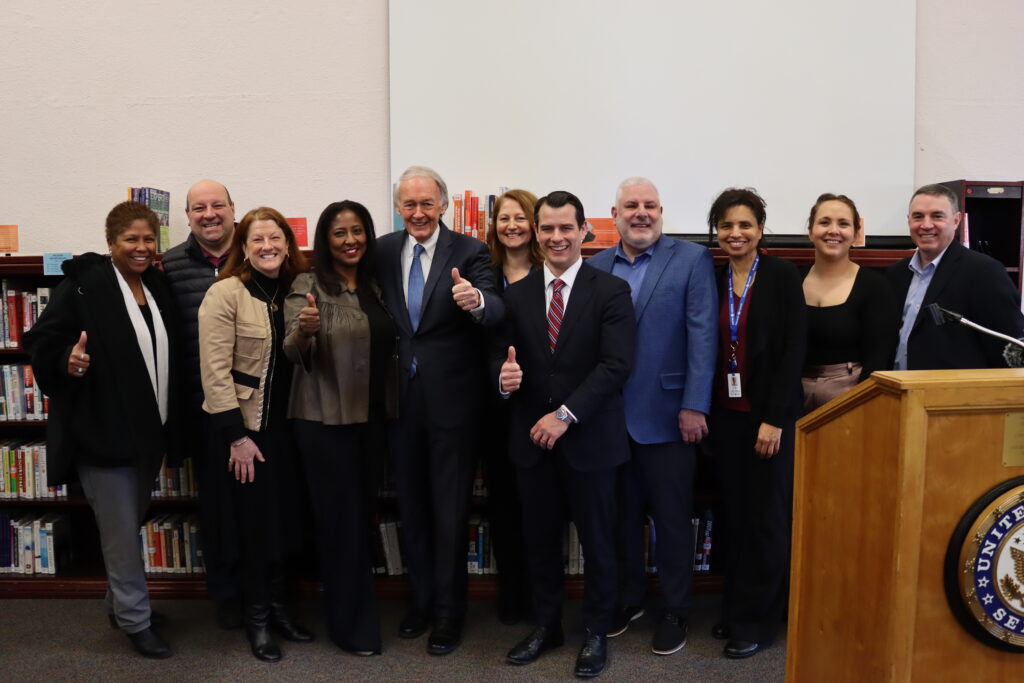Spring Advocacy Updates
Our advocates know that meaningful change takes time – a win today only leads to change tomorrow if advocacy is ongoing.
Whether it is the restoration of state-funded food benefits for immigrants or the creation of access to counsel in eviction cases, when we take on issues, we are making a long-term commitment.
The successes we’ve had in the past few months are the result of that committed advocacy – and will be the catalyst for more wins down the road. Thank you for joining us on this journey towards justice.
Why Congress Needs to Extend the Affordable Connectivity Program

In honor of Black History month, I would be remiss if I did not mention that before he passed, the great civil rights leader Congressman John Lewis described access to the internet as the civil rights issue of the 21st century. Congressman Lewis, as many people today, recognized that without access to the transformational power of the internet, people – especially Black and other people of color – will be left out of opportunities and left behind progress.
SCOTUS Decision Perpetuates Systemic Barriers to Opportunity
The Massachusetts Law Reform Institute (MLRI) is deeply disappointed in yesterday’s U.S. Supreme Court ruling in Students for Fair Admissions v. President and Fellows of Harvard College. Although the ruling was not unexpected, the upending of decades of precedent is once again shocking. This decision is a setback in the progress that has been made to increase educational and economic opportunity for communities of color who have been historically and presently excluded from so many opportunities, most notably opportunities of educational and economic advancement.
Celebrating Martin Luther King Jr. Day 2023
As we celebrate Martin Luther King Jr. Day today, we are taking inspiration from Dr. King’s lifelong commitment to economic justice. Dr. King’s anti-poverty advocacy is often glossed over in the pursuit of a simple, sanitized story of King and his legacy – but there is no doubt his dream of justice included the eradication of poverty.
Statement of Georgia D. Katsoulomitis, Executive Director of the Massachusetts Law Reform Institute, in Response to the Dobbs v. Jackson Decision
The U.S. Supreme Court’s decision in Dobbs v. Jackson Women’s Health Organization is a stunning reversal of legal precedent and the loss of a constitutional right that has been protected for almost half a century. The reversal of Roe v. Wade is not only a devastating loss of reproductive rights for women in the United States but it is also an affront to the fundamental right to bodily autonomy and to our privacy rights. Furthermore, it opens the door to legal challenges that threaten to weaken or eliminate other important fundamental rights and liberties.
Dobbs does not outlaw abortion in the United States; it simply leaves the legality of abortion access to each individual state. The consequence is that the choice of whether a woman has access to reproductive health services will depend on where in the United States she happens to live. Women of economic means who reside in states that restrict or outlaw access to abortion may have the financial ability to travel to states where abortion remains legal and accessible. However, low income women in states with restrictive abortion access now have no choice or options – at least not safe ones.
The Moral Imperative of Anti-Racism
On June 19, 1865, Major General Gordon Granger led a contingent of Union soldiers into Galveston, Texas to inform its citizens that slavery had been abolished. Two and half years after the Emancipation Proclamation and less than six months before emancipation officially became national policy, the last Confederate bastion ended the inhuman practice of slavery – and more than 250,000 Black people in Texas were granted their freedom.
Senate Ways and Means FY 2023 Budget Proposal: Preliminary Analysis of Key Issues Affecting Low-Income Massachusetts Residents
On May 10, 2022, the Senate Committee on Ways and Means released its budget proposal for fiscal year 2023 (FY 23), which is referred to as Senate 4. The Massachusetts Law Reform Institute prepared this analysis of selected budget topics impacting low-income residents of the Commonwealth:
- Cash Assistance, SNAP and Related Items Administered by DTA
- Child Welfare: DCF and Related Items
- Criminal Justice Reform
- Health Issues in MassHealth and ConnectorCare
- Homeless Services
- Housing
- Legal Services/Massachusetts Legal Assistance Corporation
Join us at the African Meeting House on April 28
On April 28, the Massachusetts Law Reform Institute (MLRI) will be hosting our 2022 Catalyst for Change event at the African Meeting House on Boston’s Beacon Hill. Built in 1806 and located in Smith Court, the Meeting House is considered the oldest extant Black church building in America. Smith Court served as a center for Boston’s Black community in the 19th and early 20th centuries. Along with the Meeting House, it is also home to the Abiel Smith School, which today houses the Museum of African American History.
